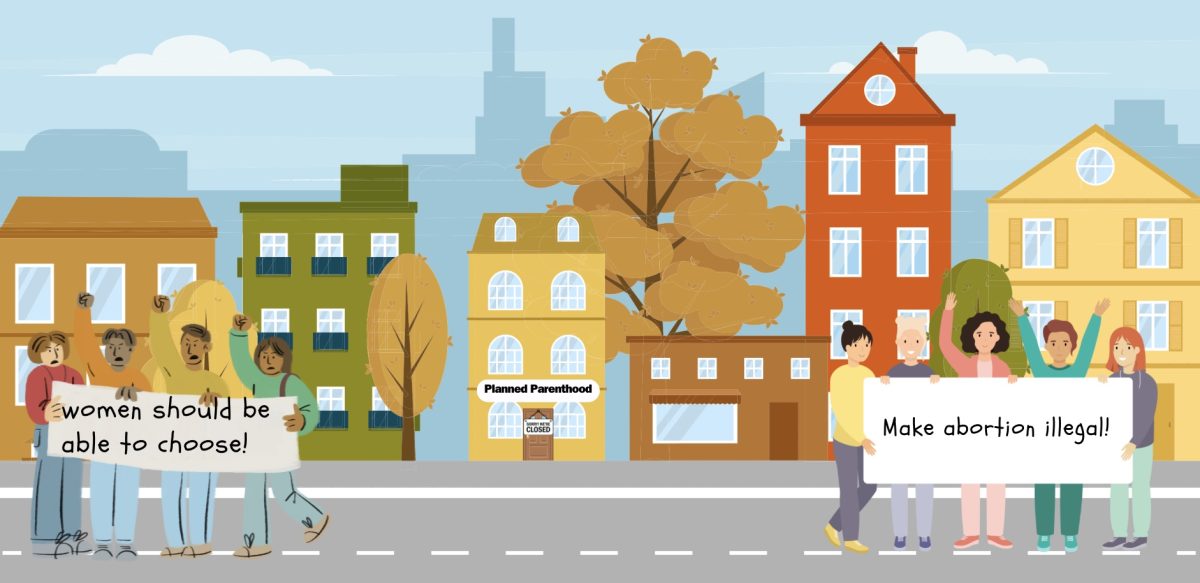Abortion can be a sensitive topic within politics, healthcare, and from person to person.
On January 22, 1973, the Supreme Court passed a ruling called Roe V. Wade which made abortion in the United States legal. However, the act did not necessarily protect the accessibility to the procedure, but just the right to have one.
According to Planned Parenthood, this caused many states to make it difficult for their residents to get an abortion, creating laws to add to the difficulty like lengthening the waiting time to schedule the procedure.
Now, 50 years later, on Friday, June 24, this same ruling was overturned. Since then, countless states have changed their laws in relation to the rights to an abortion.
On April 9, the Arizona Supreme Court came to the conclusion to reinforce a law from 1864 that will ban abortions unless the mother’s life is at risk, according to Jessica Valent, writer for the newsletter “Abortion, Every Day.” This law was made before the time that Arizona became its own state in February of 1912, as well as before the year women could vote, which was not until August of 1920. The ban will go into effect on June 8, 2024.
In Florida, abortion was accessible up to 15 weeks of pregnancy, however, starting May 1, women can not get an abortion after six weeks of pregnancy. The exceptions include the mother’s health, a diagnosis that would result in the fetus’s death, or if the pregnancy was a result of rape, incest, or human trafficking.
In Texas, abortion has been completely banned since 2022 after a trigger law was passed.
The law in Texas originally stated that a woman could not get an abortion after six weeks or when a heartbeat was detectable. This was put into place on September 1, 2021. At six weeks, most women do not know they are pregnant, due to the symptoms not being obvious enough and can be confused for a different diagnosis.
Women’s Studies Professor at City College Danielle Swiontek has a master’s degree in sociology and a doctorate of philosophy degree in U.S. history with a focus on women’s history.
She claims that a group by the name of Pharmacists for Life International add to the lack of abortion rights today.
The group allows pharmacists to not fill prescriptions for things they were not comfortable with. This can include prescriptions for Plan B, abortion medication and attention-deficit/hyperactivity disorder (ADHD) medication.
“Starting in 2005 I started sort of warning students like ‘there’s something afoot here,’” Swiontek said.
She added that there was a shift in the Supreme Court when Brett Kavanaugh, Amy Coney Barrett, and Neil Gorsuch were appointed by former President Donald Trump as associate justices.
“Instead of being a 5-4 court with a swing vote, it’s a 6-3 court with this very conservative group of justices,” Swiontek added.
With all things considered, Swiontek believes that a very dangerous environment is being created for those who are pregnant in certain states, as it can be difficult to find an obstetrician-gynecologist doctor, otherwise known as an OB-GYN. Professional doctors are leaving the states they work in due to the bans being placed on abortions threatening their medical license. If they conduct an abortion past a certain time or “wrong” circumstances, they are threatened with time in jail or even the loss of their medical license.
Idaho is an example of this, a report was published in February of 2024 that revealed they lost 22% of their obstetricians 15 months after their abortion bans were put into place.
“Why would you stay and practice if doing normal healthcare means that you can end up in prison?” Swiontek stated.
Guttmacher Institute created an interactive map for individuals to find their state and abortion laws and enforcement, including other abortion statistics.
Physicians are also extremely limited in being able to treat someone who needs an abortion if it is threatening the mother’s life. In many states, women can not be treated for termination until they are extremely ill. Waiting this long can result in complications for the woman’s health, in severe cases complete hysterectomies have had to be done because of how long the woman waited.
Mayron Hollis, a woman living in Tennessee, endured this experience. She found out that she was pregnant once again after giving birth just months prior. She was diagnosed with a cesarean scar pregnancy, which if taken to term, could cause her to eventually hemorrhage and die. According to Hollis, because of how complex the surgery she needed was and the ban that took place, there were just not enough doctors willing to help Hollis because it could mean the end of their career.
She was forced to carry the fetus for 25 weeks, during which she had a cesarean section birth and due to the damage, had to get a full hysterectomy to save her life. This means she can never carry her own child again.
In Ohio, a woman named Brittany Watts miscarried in her home and flushed the remains down the toilet, resulting in her arrest for “abuse of a corpse” and was taken to court. She had made two visits to the hospital before the miscarriage had taken place as she was showing signs that something was wrong with the pregnancy but was turned away both times. When Watts went to the hospital once again for the miscarriage, the nurse taking care of her called the police. The charges were dropped on Jan 11, 2024.
“There is a path where this is not just about abortion, it’s about really striping more and more rights away from women,” Swiontek said.









![Milton Alejandro Lopez Plascencia holds a flag showcasing the United States and Mexico on Feb. 7 in Santa Barbara, Calif. “It’s heartbreaking to see what is happening all across the country,” Lopez Plascencia said. “I [want] my voice to be heard by the community.”](https://www.thechannels.org/wp-content/uploads/2025/05/MGSImmigration-1-1200x800.jpg)




